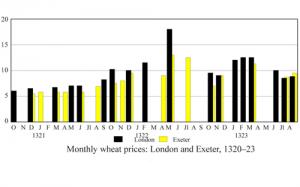Market networks and the metropolis: the trade in agrarian produce, c.1400

The role of the market in society is the subject of much contemporary debate. Particular interest centres on medieval England where the emergence of a precocious system of efficient markets may underlie the country's distinctive course of long-term economic development. This project tries to reconstruct the operation of the market system of the London region c. 1400. Rich documentary sources exist which permit examination of the flows of agricultural and other produce through the network of local markets, towards London and elsewhere.
The project also builds on the foundations laid by the Feeding the city (I) and (II) projects. It examines the connections between specialisation in production and specialisation in marketing in the provisioning of a major city. See also Metropolitan market networks, 1300-1600.
Publications
James A. Galloway, 'Metropolitan market networks: London's economic hinterland in the later Middle Ages', London and Middlesex Archaeological Society Transactions, 50 (1999), 91-98; James A. Galloway, 'Reconstructing London's distributive trade in the later middle ages: the role of computer-assisted mapping and analyses' in M. Woollard (ed.), New windows on London's past: information technology and the transformation of metropolitan history (Association for History and Computing (UK), 2000), pp. 1-24; James A. Galloway, 'Urban hinterlands in later medieval England', in K. Giles and C. Dyer (eds.), Town and country in the Middle Ages: contrasts, contacts and interconnections 1100–1500 (Society for Medieval Archaeology Monograph 22, 2005).
Reports
CMH Annual Reports 1993-4, 1994-5, 1995-6, 1996-7, Tenth Anniversary Conference paper
Project details
Researchers: James Galloway, M.A., Ph.D., Margaret Murphy, B.A., Ph.D.
Funded by: The Leverhulme Trust (Ref: F264/G) (1 October 1994-31 July 1997)
Amount Awarded: £129,010
